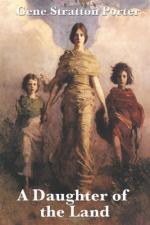“Miss Medira, Dora, Ann, cast her net, and catched a man!” recited Susan from the top step, at which they all laughed.
“No, I have not had the pleasure of casting my optics upon the individual of Nancy Ellen’s choice,” said Agatha primly, “but Miss Amelia Lang tells me he is a very distinguished person, of quite superior education in a medical way. I shall call him if I ever have the misfortune to fall ill again. I hope you will tell Nancy Ellen that we shall be very pleased to have her bring him to see us some evening, and if she will let me know a short time ahead I shall take great pleasure in compounding a cake and freezing custard.”
“Of course I shall tell her, and she will feel a trifle more stuck up than she does now, if that is possible,” laughed Kate in deep amusement.
She surely was feeling fine. Everything had come out so splendidly. That was what came of having a little spirit and standing up for your rights. Also she was bubbling inside while Agatha talked. Kate wondered how Adam survived it every day. She glanced at him to see if she could detect any marks of shattered nerves, then laughed outright.
Adam was the finest physical specimen of a man she knew. He was good looking also, and spoke as well as the average, better in fact, for from the day of their marriage, Agatha sat on his lap each night and said these words: “My beloved, to-day I noted an error in your speech. It would put a former teacher to much embarrassment to have this occur in public. In the future will you not try to remember that you should say, ‘have gone,’ instead of ‘have went?’” As she talked Agatha rumpled Adam’s hair, pulled off his string tie, upon which she insisted, even when he was plowing; laid her hard little face against his, and held him tight with her frail arms, so that Adam being part human as well as part Bates, held her closely also and said these words: “You bet your sweet life I will!” And what is more he did. He followed a furrow the next day, softly muttering over to himself: “Langs have gone to town. I have gone to work. The birds have gone to building nests.” So Adam seldom said: “have went,” or made any other error in speech that Agatha had once corrected.
As Kate watched him leaning back in his chair, vital, a study in well-being, the supremest kind of satisfaction on his face, she noted the flash that lighted his eye when Agatha offered to “freeze a custard.” How like Agatha! Any other woman Kate knew would have said, “make ice cream.” Agatha explained to them that when they beat up eggs, added milk, sugar, and corn-starch it was custard. When they used pure cream, sweetened and frozen, it was iced cream. Personally, she preferred the custard, but she did not propose to call it custard cream. It was not correct. Why persist in misstatements and inaccuracies when one knew better? So Agatha said iced cream when she meant it, and frozen custard, when custard it was, but every other woman in the neighbourhood, had she acted as she felt, would have slapped Agatha’s face when she said it: this both Adam and Kate well knew, so it made Kate laugh despite the fact that she would not have offended Agatha purposely.




